WHEELING, W.Va. – The City of Wheeling and multiple social services organizations provide resources to the area homeless population, but are their measures helping the homeless improve their lives and achieve self-sufficiency and dignity, and is anyone considering the disruption the homeless have on the neighborhoods where local citizens live?
These are some of the questions community activist Carlee Dittmar is asking since the city designated a homeless camp near the neighborhood where she grew up in the Fulton section of Wheeling.
Dittmar took me to the homeless camp in Fulton on a recent warm, late summer afternoon. When we entered the camp entrance, a City of Wheeling worker asked why we were there. Dittmar said she lives in Fulton and wants people to know what is really happening with the camp and the chaos she says it brings to her doorstep.
At the camp, we saw two rows of tents with clothing, bicycles and trash strewn about. We saw several Kroger shopping carts and a table filled with hanging baskets of flowers. There were portable toilets provided by the city which Dittmar says are not always cleaned. She opened the stalls and checked them and said they were in better condition that day. There were just about a dozen people at the camp that afternoon. We also saw a baby stroller but a woman at the camp said no children were there. Dittmar says children have been in the camp but social services authorities took them into custody.
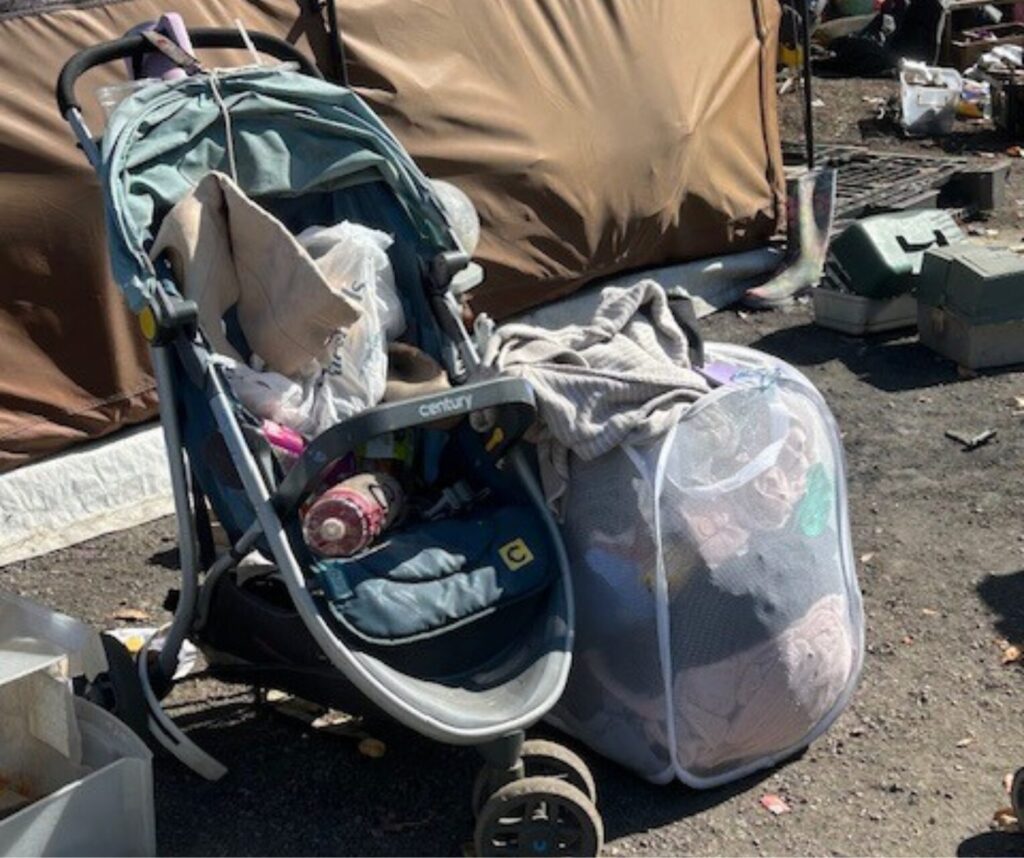
Dittmar says the multiple attempts to address the plight of the homeless by the city and social services groups have been useless and pointed to the sad conditions of trash, tattered tents and desperate people in the Fulton homeless camp.
“Now, you tell me how this is helping anyone.”
Carlee Dittmar, Wheeling community activist
Images from the Fulton Homeless camp taken on Sept. 17, 2025 (photos by Karen Fatula)
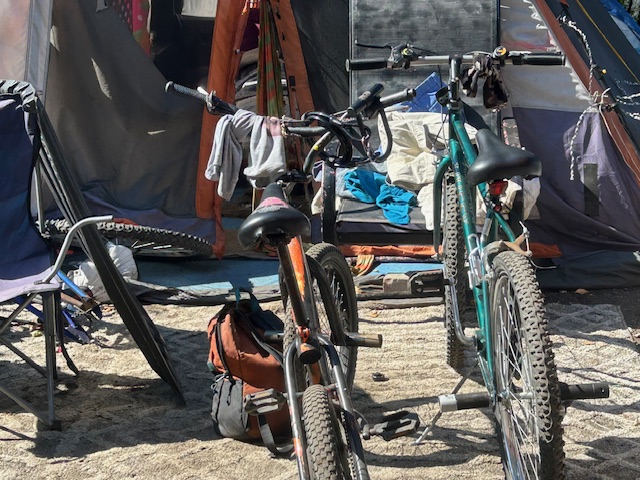
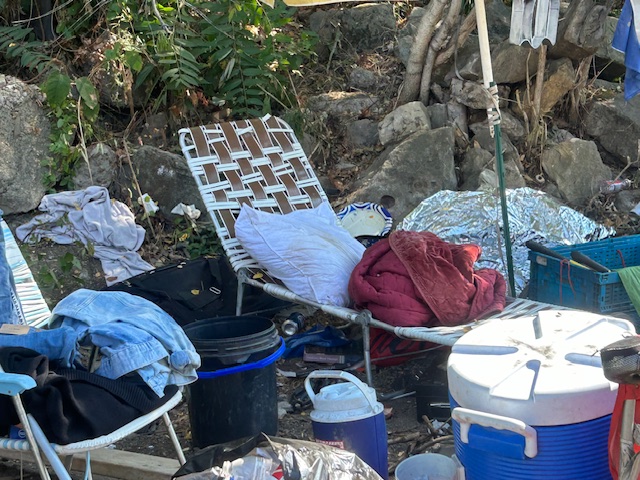
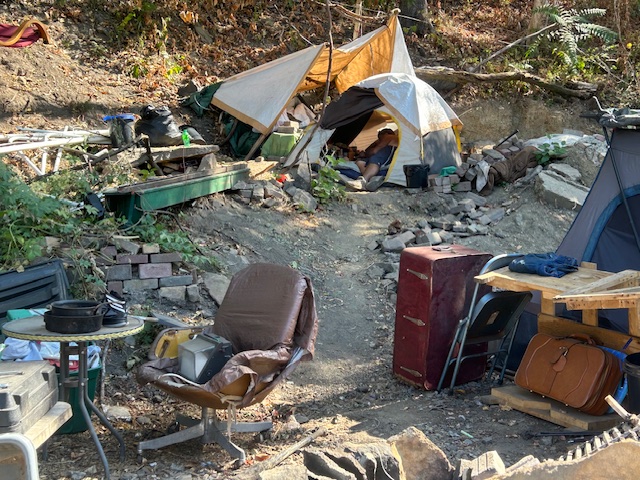
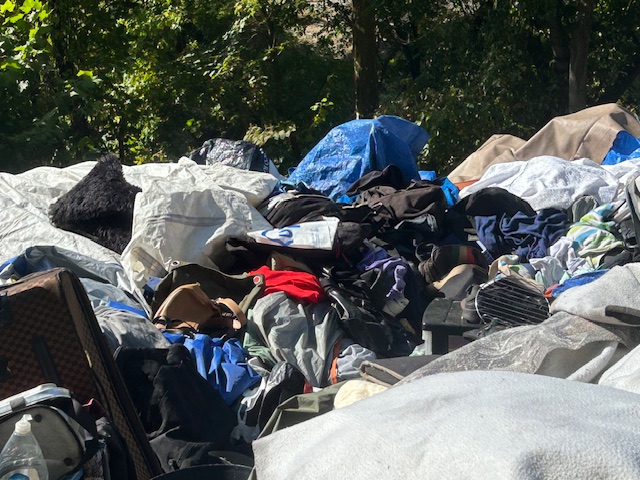
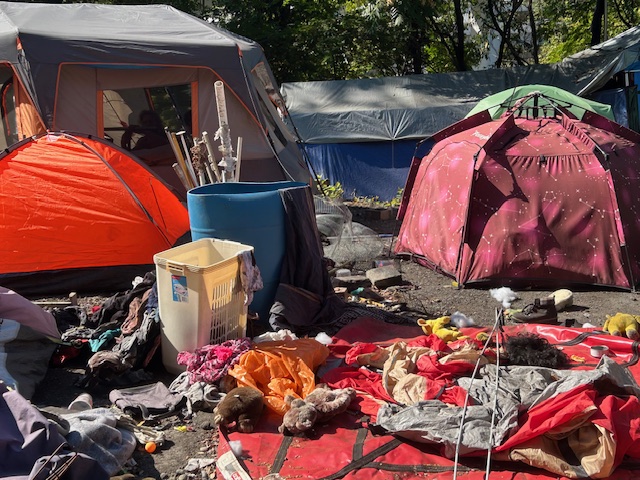
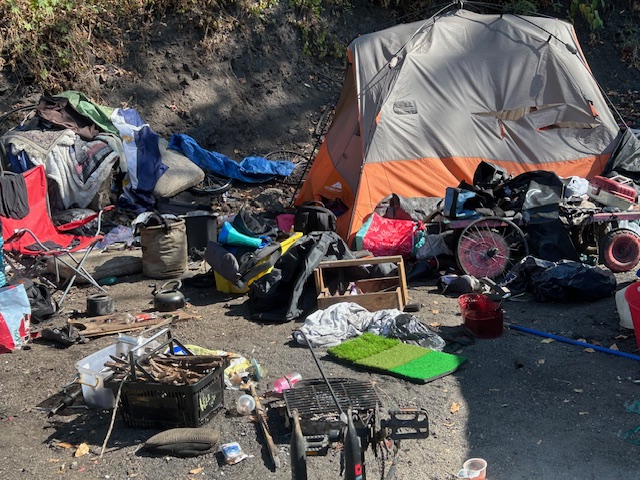
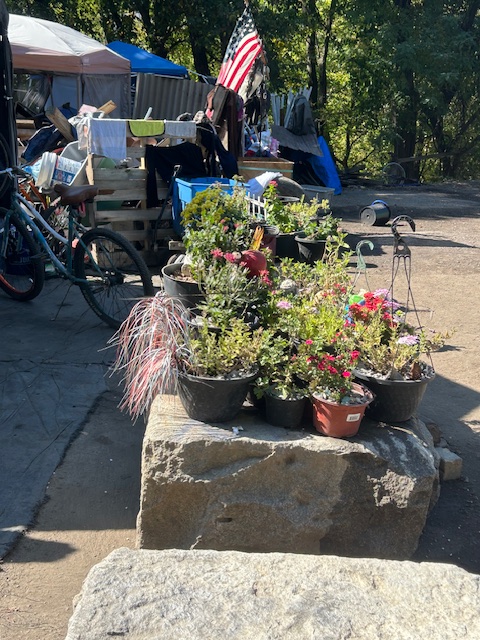
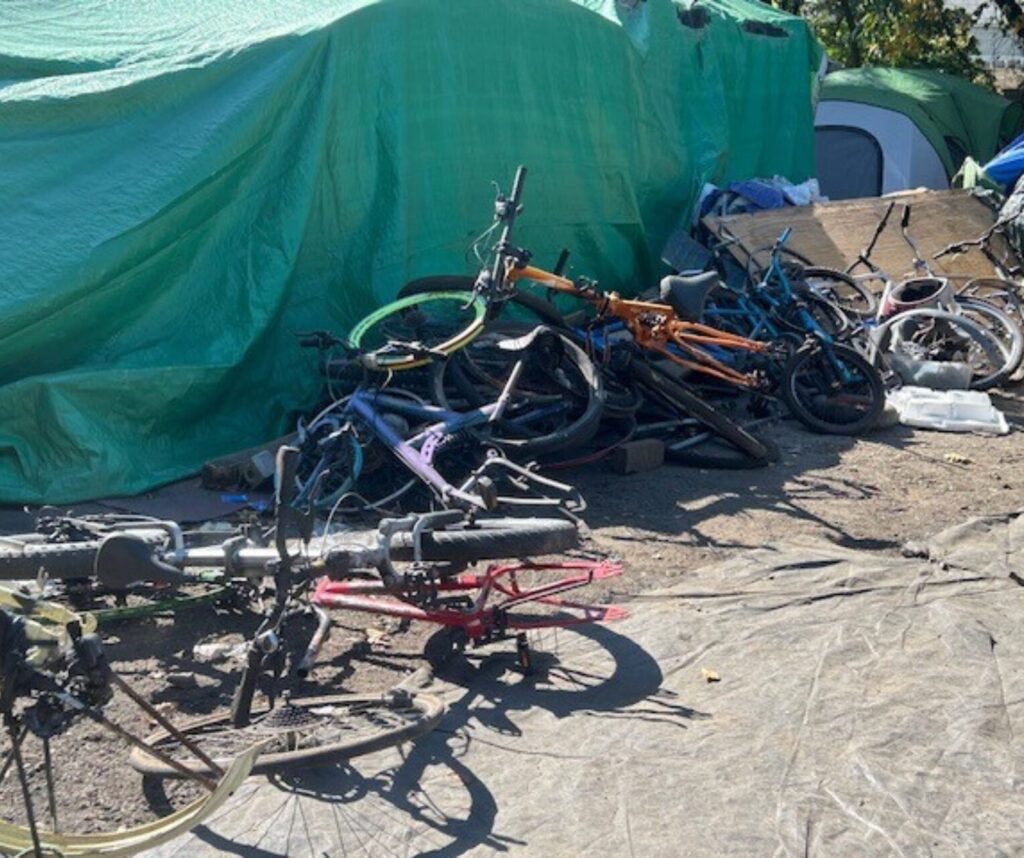
Dittmar claims thefts are now common in her once peaceful neighborhood and that residents are frightened. Dittmar is 71-years-old and has lived in the same house all her life. She says Wheeling has changed for the worse from the “Friendly City” she remembers growing up in.
“I’ve never seen such a mess in my life. This was such a nice thing. You don’t know your neighbors or anyone. You just don’t know who they are.”
Carlee Dittmar, Wheeling community activist
Dittmar and I spoke to people in the homeless camp. She says she is there to help them. But Dittmar does not think that the resources the City of Wheeling and social services groups like Street Moms offer are effective in truly helping homeless individuals. These services are mere patches on a long-festering wound that has no specific cure, at least not one that those who purport to help the homeless can agree on.
Dittmar says Street Moms give dog biscuits to the homeless people’s dogs. She also says some of the dogs are pit bulls which guard the camp. There were no dogs at the camp on the afternoon Dittmar and I visited.
Dittmar says Wheeling is a magnet for homeless people from across the U.S. due to the plethora of services available to them including Catholic Charities, The Soup Kitchen, Street Moms and the Life Hub homeless shelter. She says she spoke with multiple people from the homeless camp on previous visits who were from different states including Tennessee and Alabama. Other cities provide one-way bus tickets to Wheeling for their homeless, Dittmar claims. A woman I spoke to at the homeless camp said the people there that day were Ohio Valley locals.
“Not one person from West Virginia… all the other camps are closing down, they’re telling them when they get out of jail to come here,. And the reason is, and even our mayor said this, they get more free stuff in Wheeling.”
Carlee Dittmar, Wheeling community activist
With the number of resources available to Wheeling’s homeless population, have their lives improved or are there fewer people living on the streets or in camps? River News reached out to Wheeling Mayor Denny Magruder and the Life Hub, but neither responded to our questions.
Over the past few years, the city and social services groups have moved the homeless population across various locations including “managed” encampments, the former OVMC Hillcrest psychiatric unit, Catholic Charities offices, the Fulton camp and the Life Hub. The city even employed a Homeless Liaison from 2021 until that person resigned in 2024.
The assistance provided by the Life Hub does not seem to provide a permanent solution to people in the homeless camp since they may return to the camp after their Life Hub stay. A woman I spoke to at the Fulton homeless camp said she does not go to the Life Hub since her belongings will be stolen from her tent while she is in the shelter. Dittmar says the Life Hub began as winter shelter but now operates year-round.
Concerns over homelessness in Wheeling continue to mount, but Dittmar says her worries are not addressed at city council or even at the state level about how political leaders are handling the issue.
Dittmar reached out to West Virginia State Representative Riley Moore for policy guidance, only to be told, “Well then, you can Google it.” Dittmar said she pushed back, retorting, “That’s not my job, This is your job.”
Dittmar says the homeless need serious interventions like drug treatment and mental health care. She says despite all the services provided to the homeless population, the situation is becoming more disturbing with some recent alarming incidents.
“Three weeks ago a guy went to the Marathon… stripped down naked, took a bath in the creek, and, naked, walked over in front of Wheeling Country Day School.”
Carlee Dittmar, Wheeling community activist
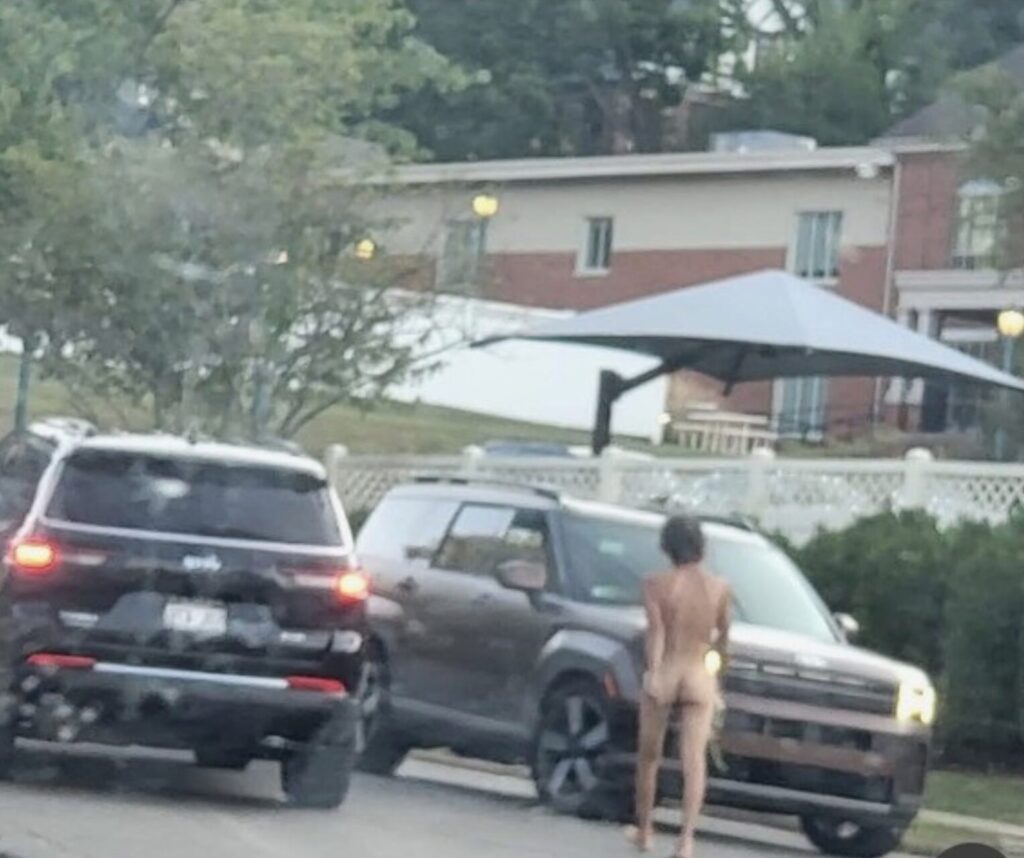
Dittmar sent me a photo from earlier this week of an alleged homeless man passed out at Sheetz gas station near the Woodsdale section of Wheeling.
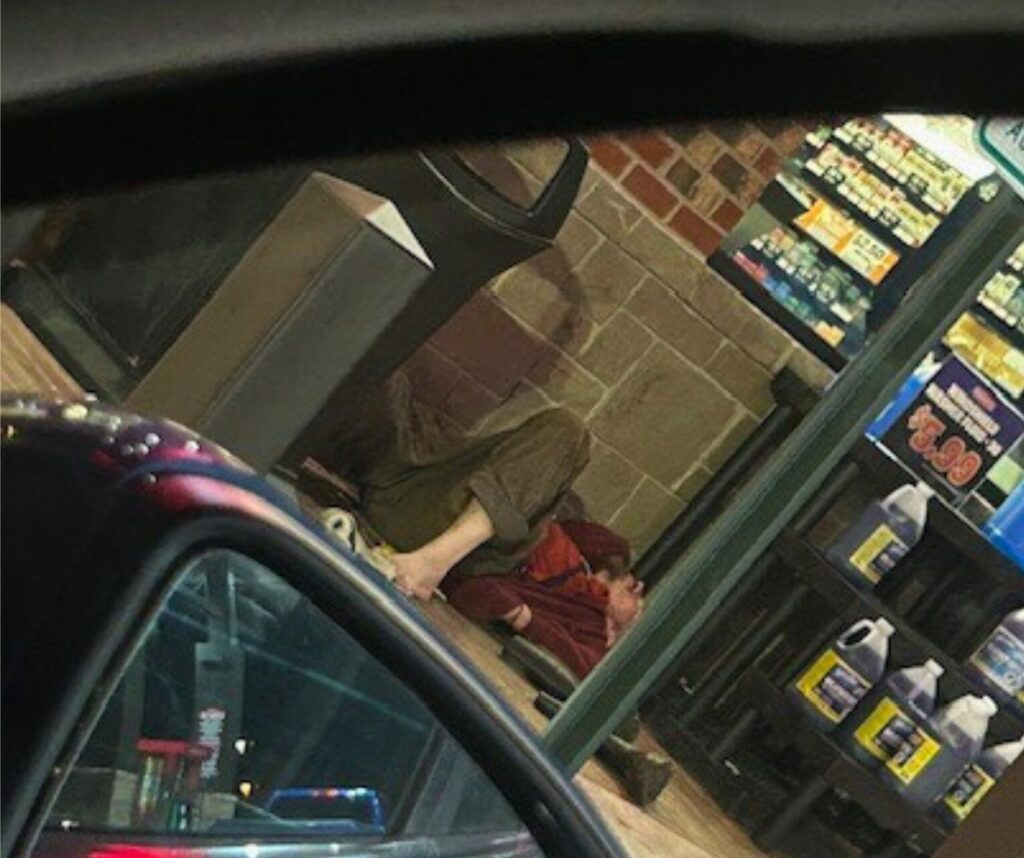
Dittmar is passionate about helping the homeless and Wheeling residents. She asks local and state leaders to come together to offer intervention and solutions that work to offer hope and dignity to the homeless and not just band-aids to mask over the problems of the “unhoused.”




